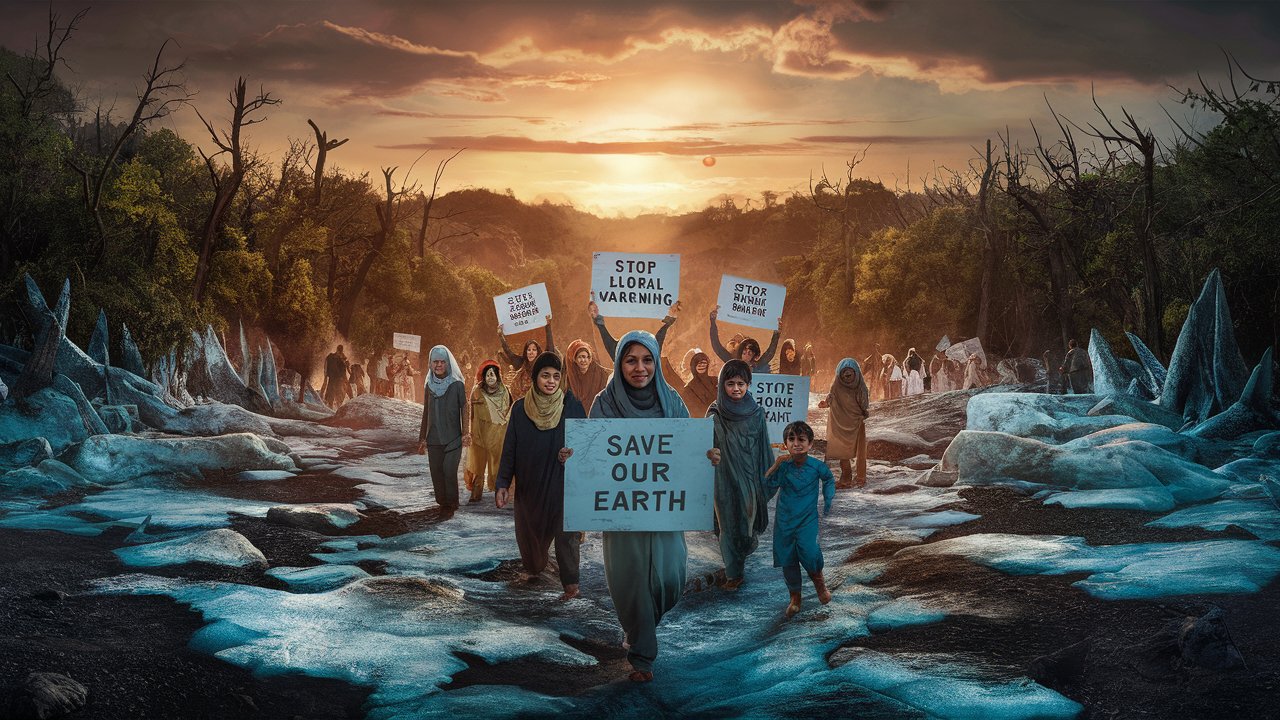Q. No.5. Global warming presents an existential threat to states like Pakistan.
Examine the far-reaching impacts of global warming on Pakistan and propose a model of economic development that aligns with environmental protection.

Q. No.5. Global warming presents an existential threat to states like Pakistan.
Introduction:
Global warming poses a significant existential threat to states like Pakistan, with its vulnerable geography and dependence on climate-sensitive sectors such as agriculture and water resources. This essay explores the far-reaching impacts of global warming on Pakistan and proposes a model of economic development that aligns with environmental protection to mitigate these challenges.
Impacts of Global Warming on Pakistan:
- Water Scarcity:
- Pakistan heavily relies on glacial meltwater for irrigation and drinking purposes. However, rising temperatures accelerate glacial melting, leading to increased water scarcity and affecting agricultural productivity and human settlements.
- Extreme Weather Events:
- Global warming exacerbates the frequency and intensity of extreme weather events such as floods, droughts, and heatwaves in Pakistan. These events cause widespread damage to infrastructure, agriculture, and livelihoods, displacing populations and straining resources for disaster management.
- Agricultural Losses:
- Changes in temperature and precipitation patterns adversely affect agricultural yields and food security in Pakistan. Erratic monsoon rains, prolonged droughts, and pest outbreaks disrupt crop cycles, leading to economic losses and exacerbating poverty and food insecurity.
- Health Risks:
- Rising temperatures contribute to the spread of vector-borne diseases, heat-related illnesses, and malnutrition in Pakistan. Vulnerable populations, including children, the elderly, and marginalized communities, are disproportionately affected by these health risks.
Model of Sustainable Economic Development:
- Renewable Energy Transition:
- Pakistan should prioritize transitioning to renewable energy sources such as solar, wind, and hydropower to reduce reliance on fossil fuels and mitigate greenhouse gas emissions. Investing in clean energy infrastructure not only reduces carbon emissions but also creates employment opportunities and promotes energy security.
- Climate-Resilient Agriculture:
- Promoting climate-smart agricultural practices, including drip irrigation, agroforestry, and crop diversification, can enhance resilience to climate change impacts while improving productivity and livelihoods. Supporting smallholder farmers with access to climate information, financial resources, and technology can empower them to adapt to changing climatic conditions.
- Ecosystem Conservation and Restoration:
- Protecting and restoring ecosystems such as forests, wetlands, and mangroves can enhance biodiversity, regulate water cycles, and sequester carbon dioxide. Implementing conservation initiatives, such as reforestation projects and protected area management, not only mitigates climate change but also provides ecosystem services essential for human well-being.
- Green Infrastructure Development:
- Investing in green infrastructure, including sustainable urban planning, green buildings, and public transportation systems, can reduce carbon emissions, improve air quality, and enhance resilience to climate-related hazards. Integrating green infrastructure into development projects promotes environmental sustainability while enhancing livability and economic competitiveness.
Conclusion:
In conclusion, global warming presents an existential threat to Pakistan, with far-reaching impacts on water resources, agriculture, public health, and livelihoods. Adopting a model of sustainable economic development that aligns with environmental protection is imperative to mitigate these challenges and build resilience to climate change. By transitioning to renewable energy, promoting climate-resilient agriculture, conserving ecosystems, and developing green infrastructure, Pakistan can pursue a pathway to sustainable development that safeguards both the environment and the well-being of its people. Effective implementation of these measures requires collaboration among government, civil society, private sector, and international partners to address the complex interlinkages between climate change, development, and environmental sustainability.
visit : https://scholarshipresort.com/